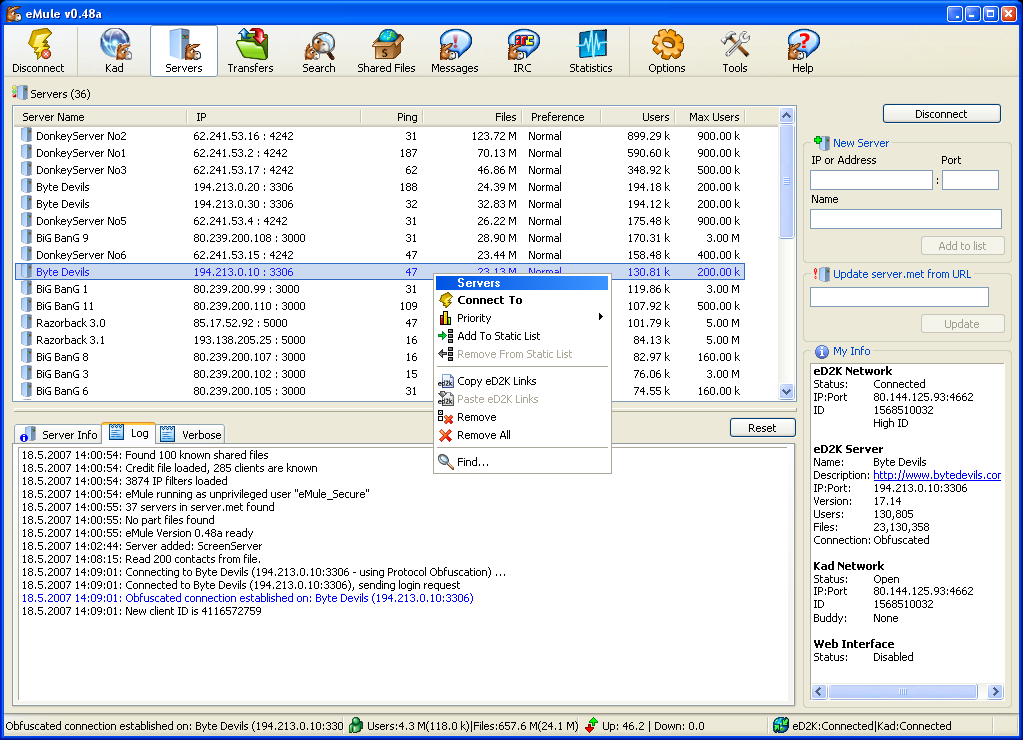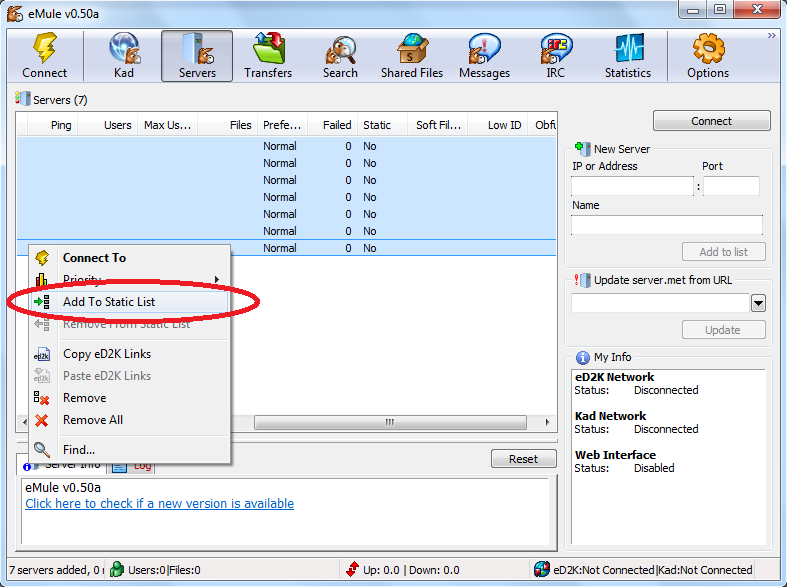eMule servers are the backbone of the eMule network, facilitating peer-to-peer file sharing. They act as central hubs where users can connect, search for files, and download content from other users. This guide delves into the world of eMule servers, exploring their history, functionality, setup, security, and legal considerations. We’ll examine the different types of servers, their features, and the essential steps involved in setting up and running your own eMule server.
From understanding the technical aspects to navigating the legal and ethical landscape, this comprehensive guide aims to provide a clear and informative overview of eMule servers, empowering you to make informed decisions about their use.
eMule Server Security and Privacy

Running an eMule server can be a rewarding experience, offering access to a vast library of files and connecting with other users. However, it’s crucial to understand the potential security and privacy risks involved and take necessary precautions to protect your server and personal information.
Security Risks
Operating an eMule server exposes you to several security risks, including:
- Data Breaches: Your server’s data, including user files and server logs, could be compromised by unauthorized access or malicious attacks. Hackers may exploit vulnerabilities in the server software or network configuration to steal or modify data.
- Malware Infections: eMule servers are susceptible to malware infections. Users can inadvertently download and spread malicious files, potentially infecting your server and other connected clients. This can lead to data loss, system instability, and even compromised personal information.
- Unauthorized Access: Hackers may attempt to gain unauthorized access to your server to steal data, modify files, or launch attacks against other systems. This can happen through brute-force attacks, exploiting vulnerabilities, or social engineering techniques.
Security Best Practices
To mitigate these risks, it’s essential to implement robust security measures:
- Strong Passwords: Use a strong and unique password for your server administrator account. Avoid common passwords and use a password manager to generate and store secure credentials.
- Firewall Protection: Configure a firewall to block unauthorized access to your server. A firewall acts as a barrier, filtering incoming and outgoing network traffic based on predefined rules. This helps prevent unauthorized connections and potential attacks.
- Regular Software Updates: Keep your eMule server software and operating system up to date. Software updates often include security patches that address vulnerabilities and protect against known threats.
- Secure Network Configuration: Use a secure network configuration, including strong encryption protocols and secure network protocols, to protect data transmitted between your server and clients.
- User Access Control: Limit user access to your server to only authorized individuals. Implement user accounts with appropriate permissions and restrict access to sensitive data and system configurations.
Privacy Implications
eMule servers involve the sharing of files and data, raising concerns about privacy:
- Data Collection: The server may collect data about user activity, including IP addresses, download and upload statistics, and file sharing preferences. This data could be used for various purposes, including server administration, network analysis, and potentially for targeted advertising or profiling.
- User Tracking: eMule servers can potentially track user activity, including files shared, download and upload patterns, and connections established. This information could be used for various purposes, including user profiling, targeted advertising, or even monitoring by authorities.
- Anonymity Concerns: While eMule uses a decentralized network structure, it’s not inherently anonymous. Users’ IP addresses and other identifying information can be tracked through various means, potentially compromising their privacy.
Legal and Ethical Considerations
Operating an eMule server raises significant legal and ethical concerns, primarily related to copyright infringement and data privacy. Understanding these aspects is crucial for responsible file sharing and server administration.
Legal Implications of Operating an eMule Server
Operating an eMule server can have legal consequences due to its potential for facilitating copyright infringement. While eMule itself is not inherently illegal, its use for sharing copyrighted files without permission is. Here’s a breakdown of the legal implications:
- Copyright Infringement: Downloading or sharing copyrighted files without permission is illegal in most jurisdictions. Operating an eMule server can facilitate this activity, making the server administrator potentially liable for copyright infringement.
- Data Privacy Regulations: Data privacy laws, such as the General Data Protection Regulation (GDPR) in the European Union, require individuals to obtain consent for the collection and processing of personal data. An eMule server might collect user information, including IP addresses, which could be subject to these regulations.
Ethical Considerations of File Sharing
File sharing, especially through eMule servers, presents ethical dilemmas related to copyright and intellectual property. While file sharing can offer benefits like access to information and collaborative projects, it can also negatively impact copyright holders:
- Impact on Copyright Holders: Unlawful file sharing can significantly impact copyright holders’ revenue streams by reducing sales of copyrighted works. This can discourage creators from producing new content and ultimately harm the creative industry.
- Fair Use and Access to Information: The ethical dilemma lies in balancing the rights of copyright holders with the public’s right to access information. Fair use doctrines in some jurisdictions allow for limited use of copyrighted material for purposes such as education, research, and criticism. However, the scope of fair use is often debated and subject to interpretation.
Comparison of Legal and Ethical Aspects
Here’s a comparison of the legal and ethical aspects of eMule servers with other file-sharing technologies:
| Technology | Legal Implications | Ethical Considerations |
|---|---|---|
| eMule Server | High risk of copyright infringement due to potential for sharing copyrighted files without permission. Potential data privacy concerns. | Ethical dilemmas related to copyright infringement and impact on creators. Potential for fair use and access to information. |
| Torrent Networks | Similar to eMule servers, high risk of copyright infringement and data privacy concerns. | Similar ethical considerations as eMule servers. Potential for peer-to-peer collaboration and distribution of open-source software. |
| Cloud Storage Services | Lower risk of copyright infringement, but potential for data privacy concerns depending on service provider’s policies. | Ethical considerations related to data privacy and potential for misuse of stored information. |
The Future of eMule Servers

The future of eMule servers is uncertain, as it faces a complex interplay of evolving file-sharing technologies, shifting legal landscapes, and evolving user preferences. Evolving file-sharing technologies and changing legal landscapes pose challenges and opportunities for eMule servers, requiring adaptation and innovation to remain relevant.
Potential Trends and Challenges
Evolving file-sharing technologies and changing legal landscapes present both opportunities and challenges for eMule servers.
- The rise of cloud storage services like Dropbox, Google Drive, and OneDrive has provided users with convenient and accessible alternatives for storing and sharing files, potentially impacting the popularity of P2P file-sharing networks like eMule.
- The increasing adoption of streaming services like Netflix, Spotify, and YouTube has shifted user preferences towards on-demand access to digital content, potentially reducing the demand for file downloads.
- Enhanced copyright enforcement efforts and legal regulations, such as the Digital Millennium Copyright Act (DMCA) in the United States, have made it more challenging for eMule servers to operate without facing legal repercussions.
- The emergence of decentralized file-sharing networks like IPFS (InterPlanetary File System) and BitTorrent Swarm offer alternative file-sharing models with increased security and anonymity, potentially challenging the traditional P2P file-sharing paradigm.
Hypothetical Scenario: The Impact of Emerging Technologies, Emule server
Consider a scenario where advancements in blockchain technology lead to the widespread adoption of decentralized file-sharing networks. These networks, characterized by their distributed nature and encryption capabilities, could offer a more secure and resilient platform for file sharing, potentially displacing traditional P2P networks like eMule. In this hypothetical scenario, eMule servers might face declining user bases as users migrate towards decentralized alternatives, ultimately leading to the gradual decline of eMule as a prominent file-sharing platform.
Concluding Remarks: Emule Server
eMule servers offer a unique and powerful way to share files, connect with others, and access a vast library of digital content. While they present opportunities for collaboration and access, it’s crucial to be aware of the security, legal, and ethical implications involved. By understanding the complexities of eMule servers and adhering to best practices, you can harness their potential while mitigating risks and contributing to a responsible online environment.
Emule servers, once popular for file sharing, have largely faded from the scene. Today, many users rely on more robust and centralized solutions like a oracle server for data management. While the technology has changed, the fundamental principle of sharing information remains, reminding us of the evolution of digital communication.


